Related Research Articles
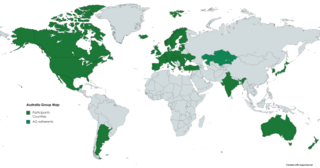
The Australia Group is a multilateral export control regime (MECR) and an informal group of countries established in 1985 to help member countries to identify those exports which need to be controlled so as not to contribute to the spread of chemical and biological weapons.
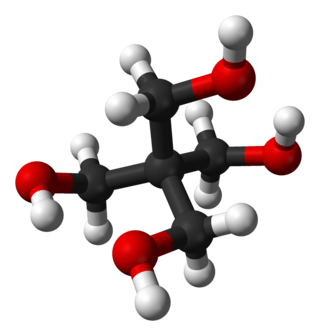
Pentaerythritol is an organic compound with the formula C(CH2OH)4. Classified as a polyol, it is a white solid. Pentaerythritol is a building block for the synthesis and production of explosives, plastics, paints, appliances, cosmetics, and many other commercial products.
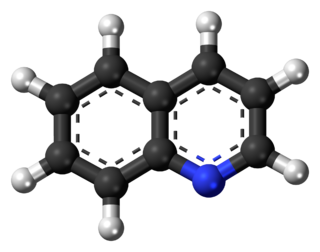
Quinoline is a heterocyclic aromatic organic compound with the chemical formula C9H7N. It is a colorless hygroscopic liquid with a strong odor. Aged samples, especially if exposed to light, become yellow and later brown. Quinoline is only slightly soluble in cold water but dissolves readily in hot water and most organic solvents. Quinoline itself has few applications, but many of its derivatives are useful in diverse applications. A prominent example is quinine, an alkaloid found in plants. Over 200 biologically active quinoline and quinazoline alkaloids are identified. 4-Hydroxy-2-alkylquinolines (HAQs) are involved in antibiotic resistance.
Novichok is a family of nerve agents, some of which are binary chemical weapons. The agents were developed at the GosNIIOKhT state chemical research institute by the Soviet Union and Russia between 1971 and 1993. Some Novichok agents are solids at standard temperature and pressure, while others are liquids. Dispersal of solid form agents is thought possible if in ultrafine powder state.
Altana AG is a German chemical company headquartered in Wesel. It was created in 1977, as a result of spinning off divisions from the Varta Group. The first CEO was Herbert Quandt.

Vanadium(III) chloride describes the inorganic compound with the formula VCl3 and its hydrates. It forms a purple anhydrous form and a green hexahydrate [VCl2(H2O)4]Cl·2H2O. These hygroscopic salts are common precursors to other vanadium(III) complexes and is used as a mild reducing agent.
In chemistry, transfer hydrogenation is a chemical reaction involving the addition of hydrogen to a compound from a source other than molecular H2. It is applied in laboratory and industrial organic synthesis to saturate organic compounds and reduce ketones to alcohols, and imines to amines. It avoids the need for high-pressure molecular H2 used in conventional hydrogenation. Transfer hydrogenation usually occurs at mild temperature and pressure conditions using organic or organometallic catalysts, many of which are chiral, allowing efficient asymmetric synthesis. It uses hydrogen donor compounds such as formic acid, isopropanol or dihydroanthracene, dehydrogenating them to CO2, acetone, or anthracene respectively. Often, the donor molecules also function as solvents for the reaction. A large scale application of transfer hydrogenation is coal liquefaction using "donor solvents" such as tetralin.
The Dortmund Data Bank is a factual data bank for thermodynamic and thermophysical data. Its main usage is the data supply for process simulation where experimental data are the basis for the design, analysis, synthesis, and optimization of chemical processes. The DDB is used for fitting parameters for thermodynamic models like NRTL or UNIQUAC and for many different equations describing pure component properties, e.g., the Antoine equation for vapor pressures. The DDB is also used for the development and revision of predictive methods like UNIFAC and PSRK.

In chemistry, a chemical transport reaction describes a process for purification and crystallization of non-volatile solids. The process is also responsible for certain aspects of mineral growth from the effluent of volcanoes. The technique is distinct from chemical vapor deposition, which usually entails decomposition of molecular precursors (e.g. SiH4 → Si + 2 H2) and which gives conformal coatings. The technique, which was popularized by Harald Schäfer, entails the reversible conversion of nonvolatile elements and chemical compounds into volatile derivatives. The volatile derivative migrates throughout a sealed reactor, typically a sealed and evacuated glass tube heated in a tube furnace. Because the tube is under a temperature gradient, the volatile derivative reverts to the parent solid and the transport agent is released at the end opposite to which it originated (see next section). The transport agent is thus catalytic. The technique requires that the two ends of the tube (which contains the sample to be crystallized) be maintained at different temperatures. So-called two-zone tube furnaces are employed for this purpose. The method derives from the Van Arkel de Boer process which was used for the purification of titanium and vanadium and uses iodine as the transport agent.
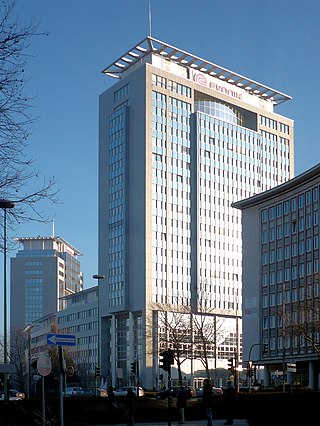
Evonik Industries AG is a publicly-listed German specialty chemicals company headquartered in Essen, North Rhine-Westphalia, Germany. It is the second-largest chemicals company in Germany, and one of the largest specialty chemicals companies in the world. It is predominantly owned by the RAG Foundation and was founded on 12 September 2007 as a result of restructuring of the mining and technology group RAG AG.
Dynamit Nobel AG is a German chemical and weapons company whose headquarters is in Troisdorf, Germany. It was founded in 1865 by Alfred Nobel.
Singapore, a major commercial hub with loose export controls on weapons, both served as a transshipment point for weapons destined for Iraq, as well as providing chemical warfare precursors and being a site for manufacture, under license, of foreign-designed weapons.

Organoruthenium chemistry is the chemistry of organometallic compounds containing a carbon to ruthenium chemical bond. Several organoruthenium catalysts are of commercial interest and organoruthenium compounds have been considered for cancer therapy. The chemistry has some stoichiometric similarities with organoiron chemistry, as iron is directly above ruthenium in group 8 of the periodic table. The most important reagents for the introduction of ruthenium are ruthenium(III) chloride and triruthenium dodecacarbonyl.
cph Deutschland Chemie- Produktions- und Handelsgesellschaft mbH is an internationally active family business based in Essen. It is one of the large-scale world-wide suppliers of biologically degradable industrial adhesives. The core competence of the undertaking lies in the production of environmentally friendly label adhesives for the foodstuffs-, packaging-, paper-processing- and cigarette industries. In the field of label adhesives, the cph group occupies the second place world-wide after Henkel. Apart from Germany it has production plants in Russia, Ukraine, Portugal and Germany. Further production plants are planned for Vietnam and Brazil. With its so-called Country Desks cph is represented in 70 countries and exports to 80. More than 90% of its German production is exported. The company was the first in Germany to be validated in accordance with the EC-Eco Audit . In the meantime cph has switched to the world-wide recognised DIN EN ISO 14001: 1996. In 2011, the cph group was awarded a certificate by the Efficiency Agency NRW in the context of the EcoProfit-project.

An alkylbenzene is a chemical compound that contains a monocyclic aromatic ring attaching to one or more saturated hydrocarbon chains. Alkylbenzenes are derivatives of benzene, in which one or more hydrogen atoms are replaced by alkyl groups. The simplest member, toluene, has the hydrogen atom of the benzene ring replaced by a methyl group. The chemical formula of alkylbenzenes is CnH2n-6.
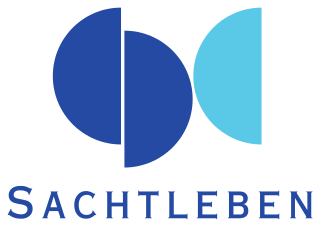
Sachtleben Chemie is a chemicals producer, with its primary focus on the production of white pigments, fillers and extenders. The company employs some 2,200 persons and achieves annual sales of around 820 million euros (2012). Sachtleben has been a member of the multinational Venator group since 2017. The company's corporate history reaches back over 130 years. Sachtleben produces particles using titanium dioxide, zinc sulfide and barium sulfate as the chemical basis, and markets these products worldwide. The principal applications for Sachtleben products include man-made fibers, paints and other coatings, plastics, and paper. Sachtleben also supplies special particles to the foodstuffs, pharmaceuticals and cosmetics industries, and has interests in the fields of chromatography, nanotechnology, catalysis, and the production of building materials. The company leads the world in special titanium dioxide grades for printing inks and for the cosmetics, pharmaceuticals and food industries. The production facilities at all three locations apply the sophisticated sulfate-route process.
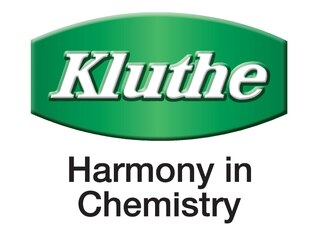
Chemische Werke Kluthe GmbH is a German-based chemical company headquartered in Heidelberg. The Kluthe group has 23 German and 39 international marketing bases and produces a total of 160,000 tons of goods to supply in 51 countries.

Marl Chemical Park is an industrial park in Marl, North Rhine-Westphalia, Germany. It is the third largest industrial cluster in Germany and among the largest chemical production facilities in Europe. The site occupies over 6 square kilometers, hosts 100 chemical plants, employs 10,000 people, and produces 4 million metric tons of chemicals annually. 18 companies are based in the Park, including primary tenant Evonik Industries AG, which also owns and operates the infrastructure through its subsidiary Infracor GmbH.

Neodymium(II) iodide or neodymium diiodide is an inorganic salt of iodine and neodymium the formula NdI2. Neodymium uses the +2 oxidation state in the compound.
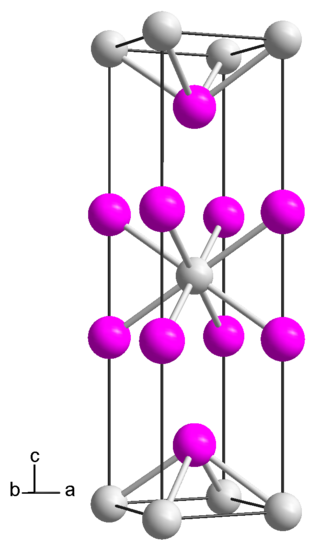
Lanthanum diiodide is an iodide of lanthanum, with the chemical formula of LaI2. It is an electride, actually having a chemical formula of La3+[(I−)2e−].